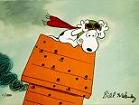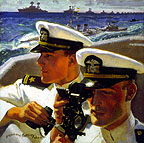Feltan
Posts: 1160
Joined: 12/5/2006
From: Kansas
Status: offline

|
quote:
ORIGINAL: veji1
quote:
ORIGINAL: Feltan
veji1,
That is a valid point if you subscribe to the notion that the ends justify the means of achieving them. I do not. There are norms and behaviors that are expected, and they transcend temporary tactical situations.
Your own post alludes to the fact that Giap departed from these expected norms of behavior. In doing so, in my opinion, his reputation and memory resides in the debris field and pond scum left in the wake of human advancement. Furthermore, I suspect in a generation or two the Vietnamese people will quietly push the memory of Giap to the back of the bus; a bit embarrassed by his brutality and excesses. You don't have to look far for similar examples -- once "great" people who are rapidly disowned once the implications of their behavior is evaluated outside of the current period's passion.
Regards,
Feltan
Fair enough, from a moral standpoint your view is valid, but my point was that from a political and military point of view, such a view is but a set of blinkers. It makes you unable to fully grasp what are the means at your disposal to achieve victory.
With such a view, once the US was fully committed, the only rational (or be it "moral") choice for North Vietnam would have been to accept defeat and give up on unifying vietnam under their terms. Interestingly enough your view is very similar to that of the US leaders until 69/70, summarised by McNamara as "inability to put ourselves in their shoes". This is a view that leads to defeat.
And lastly, your point about "great" people is again morally valid, but politically beside the point : most of the great political and military leaders were at some point butchers until the 19th century at least, plunder rape and death were part of the game, their barbarity but the reflection of their time. In our western view of warfare of the middle 20th century epitomized by the bombing campaigns on Germany, Japan or North Vietnam, plunder and rape are barbarities, but mass bombing of civilians is fair game... Where is the line ? morality is a historical concept which evolves with time and distance.
Again i don't mean to say your views are not valid, in absolute, but that to evaluate the figure of Giap and the context of the 35 years long vietnamese war of liberation, they dramatically corner your analysis and evaluation.
veji1,
While in this case I believe the moral outrage of his actions is of paramount concern, for sake of discussion I will stipulate to your points. Even so, I question his greatness even in a pure military/political realm.
First, to be clear, this was a war of naked aggression. South Vietnam did not want to be liberated by North Vietnam anymore than Kuwait wanted to be liberated by Iraq, or South Korea wants to be liberated by North Korea, or Western Europe wanted to be liberated by the Warsaw Pact. Any analysis has to take into account that there was no patriotic defense of the homeland -- this was a power grab. Untold tens of thousands of South Vietnamese were executed because they didn't fully appreciate the honor that had been bestowed upon them after they capitulated. I simply reject the notion that exercising raw power is laudable, even if one does it efficiently.
What did Ho/Giap's war of national liberation provide? What will learned scholars have to say about it in 100 years? Conventional wisdom says the North Vietnamese won the political war -- they achieved their objectives. I wonder.
Giap's great grandchildren are going to be driving import model Fords, eating at McDonalds, playing on an X-Box and listening to iTunes. Their ports are open and free capitalistic trading flourishes. When I was in Ho Chi Minh City several years ago, people were lining up to see Hollywood movies. Cell phones were in great demand, and a pack of Marlboros was still a greatly sought after and welcome gift.
His great political "victory" is only valid if you evaluate the "victory conditions" in 1975. What happens if you evaluate the political outcome in, say, 2025 instead?
I believe the final analysis will point to the fact that the war didn't make any difference. The great loss of life was in vain. There was no victory. If the war had never happened, a very similar outcome was likely.
Regards,
Feltan
|
 Printable Version
Printable Version


















 .
.


 New Messages
New Messages No New Messages
No New Messages Hot Topic w/ New Messages
Hot Topic w/ New Messages Hot Topic w/o New Messages
Hot Topic w/o New Messages Locked w/ New Messages
Locked w/ New Messages Locked w/o New Messages
Locked w/o New Messages Post New Thread
Post New Thread